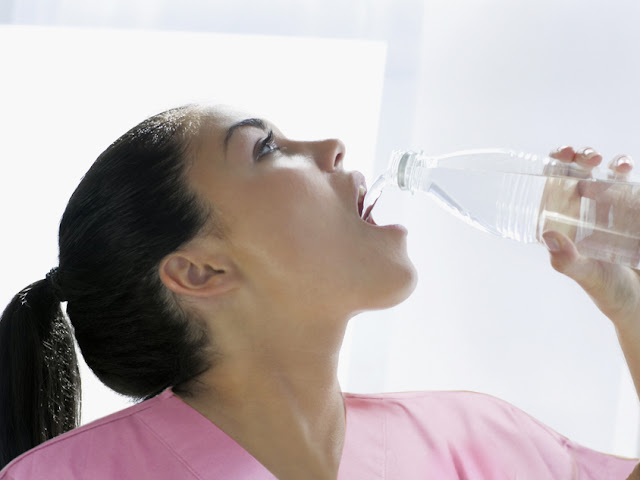A nurse's hydration status has a major influence on career performance.There is nothing like a long shift at the hospital to make a nurse feel like a raisin. The struggle to maintain hydration during a ten hour shift has been getting the best of me. I noticed toward the end of my ER shift a few worrisome symptoms: cottonmouth, headache, foggy brain, leg cramps and joint pain. My brain struggles to remain engaged and body feels like it's moving through molasses.
The Problem
Usually, I went into very shift with my gas tank nearly empty. I drank fluids when I felt thirsty or needed a caffeine jolt. The few times I drank water, I found myself constantly rushing to the restroom. We all know we cannot keep rushing to the restroom when caring for sick patients. I am expected to react promptly to a dynamic work environment that is constantly influx. Response to a demanding work environment relies on having a full gas tank. Nurses can survive without food and voiding but, they cannot live without water.
Looking for Answers
The search was on to find a few interventions to correct the hydration problem. The goal is to find a few small changes that produce maximum results. After a literature review I unearthed some compelling research based practices. Dr. Stacey Sims is a forward thinking scientists that is changing the sports world’s views about hydration. She is environmental exercise physiologist and nutrition scientists. Dr. Sims helps elite endurance athletes reach their professional goals. Her research highlight the factors that influence the small intestine water absorption. The main message is the majority of water is absorbed when the small intestine contents register just above plasma osmolarity. The balance of protein, high-water content fruits/vegetables, and lightly salted meals facilitate water transport into the bloodstream. Do not underestimate power of osmosis and the osmotic gradient. Dr. Sims recommends a few changes to boost one’s optimum performance. I could not just take a scientist’s word for it. I had to see it for myself. So I put a few hydration and nutrition tweaks into action.
Do’s
Becoming the Guinea Pig
After a few weeks of implementing these interventions, I was reaping the physical benefits. I thought these improvements were all in my head. So, I decided to go back to my old ways. I drank water only when thirsty and guzzled the soda down before I could think twice. I paid for these hasty decisions for the rest of the shift. The fog rolled over my brain. It took ten times the energy to care for my patients. Driving home I kept asking myself was it worth it? Nope. The sugar high didn’t last as long the foggy brain.
Don’ts
Juicy Grape
Today, I felt like a juicy grape. I am more agile to attack the mental and physical demands of my work day. The physical gains makes it easier to multi-task and move swiftly throughout the work day. The focus is to keep my hydration and nutrition on point during the workweek. I love looking at the ER experience as a fun obstacle course full of twist and turns. The well prepared professional has the best race.
My Massive Gains
Sharing Life Hacks
Maybe you have the same struggles and looking for some answers. I’d like to pass on any tools that can help your professional performance. I encourage you to try these small interventions and see how you feel.







0 comments:
Post a Comment